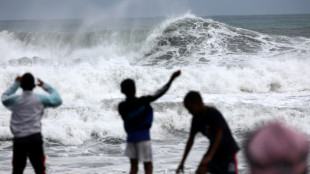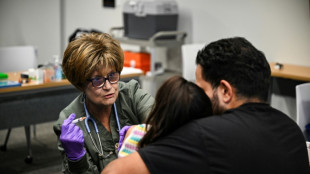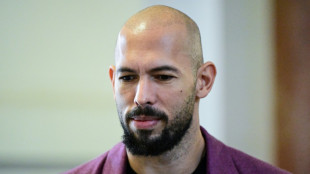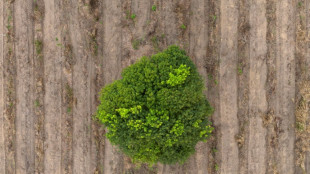
-
 Asian markets thumped as Trump tariff salvo fans fresh fears
Asian markets thumped as Trump tariff salvo fans fresh fears
-
Off leash: China's pet industry shines in ailing economy

-
 Nigerians displaced as rents double in inflation-hit Lagos
Nigerians displaced as rents double in inflation-hit Lagos
-
China vows response to latest US tariffs also targeting Canada, Mexico

-
 La Reunion residents ordered indoors as 'purple alert' cyclone nears
La Reunion residents ordered indoors as 'purple alert' cyclone nears
-
Parents rush to vaccinate children after measles outbreak hits Texas

-
 Tokyo's all-seeing Skytree tower
Tokyo's all-seeing Skytree tower
-
Zelensky, Trump to sign minerals deal at White House

-
 Marquez fires warning in first practice at MotoGP season opener
Marquez fires warning in first practice at MotoGP season opener
-
Isco, Antony tandem threat to Real Madrid on Betis visit

-
 Barre hopes to take France form to Stade Francais' Top 14 'operation survival'
Barre hopes to take France form to Stade Francais' Top 14 'operation survival'
-
PSG host Lille with Champions League blockbuster on the horizon

-
 Trump's Russia pivot keeps China guessing on Ukraine
Trump's Russia pivot keeps China guessing on Ukraine
-
Talks to resume in Cairo on next phase of Israel-Hamas ceasefire

-
 Avowed misogynist Andrew Tate in US despite rape charges in Romania
Avowed misogynist Andrew Tate in US despite rape charges in Romania
-
Worry, confusion as Vietnam slashes public jobs

-
 Rudderless Matildas desperate to reignite fire when Kerr returns
Rudderless Matildas desperate to reignite fire when Kerr returns
-
Asian markets tumble as Trump tariff salvo fans fresh fears

-
 Oscars nod 'truly magical' for Iranian film's young stars
Oscars nod 'truly magical' for Iranian film's young stars
-
Ronaldo closes on Asian Champions League crown as Saudi sides reign

-
 Constitutional crisis looms as Trump admin flirts with defying the courts
Constitutional crisis looms as Trump admin flirts with defying the courts
-
Cat tale 'Flow' goes from underdog to Oscar nominee

-
 Greece marks train crash anniversary with national stoppage
Greece marks train crash anniversary with national stoppage
-
China's leaders gather to hash out Trump tariff battle plans

-
 Man City, Man Utd turn to FA Cup glory to save poor seasons
Man City, Man Utd turn to FA Cup glory to save poor seasons
-
Israeli kibbutz rebuilds after 2023 attack as residents mull return

-
 'Anora' vs 'Conclave'? Oscars set for 'nail-biter' showdown
'Anora' vs 'Conclave'? Oscars set for 'nail-biter' showdown
-
Feted at Carnival, Afro-Brazilian faiths face hate in daily life

-
 Under pressure from Trump, Mexico extradites cartel kingpins
Under pressure from Trump, Mexico extradites cartel kingpins
-
Cotter demands '80-minute performance' from stuttering Blues

-
 S.Africa bids for first African F1 grand prix in 30 years
S.Africa bids for first African F1 grand prix in 30 years
-
'With Love, Meghan': what's behind Markle's new rebranding?

-
 Force aim to be 'nice and fast' against dangerous Reds
Force aim to be 'nice and fast' against dangerous Reds
-
N. Korea says launched cruise missiles in 'counterattack' drills

-
 Trading halted in troubled Australian casino firm
Trading halted in troubled Australian casino firm
-
Hundreds of firings at key US climate agency: lawmaker

-
 Under pressure from Trump, Mexico extradites cartel kinpins
Under pressure from Trump, Mexico extradites cartel kinpins
-
Meta plans stand-alone AI app: report

-
 Apple unveils new child safety features amid age verification debate
Apple unveils new child safety features amid age verification debate
-
What now for Venezuela with Chevron's oil permit in peril?

-
 Trump softens tone but Starmer leaves without Ukraine security pledges
Trump softens tone but Starmer leaves without Ukraine security pledges
-
World agrees hard-fought nature funding plan at UN talks

-
 West Ham ease to victory over lacklustre Leicester
West Ham ease to victory over lacklustre Leicester
-
Global stocks mostly fall on Nvidia results, fresh Trump tariff talk

-
 Trump says US, Britain working on 'great' trade deal
Trump says US, Britain working on 'great' trade deal
-
Ravens kicker Tucker again denies sex allegations

-
 Apple accused of greenwashing in US lawsuit
Apple accused of greenwashing in US lawsuit
-
Popovich says he won't return this season as Spurs coach after stroke

-
 Israel military acknowledges 'complete failure' to prevent October 7 attack
Israel military acknowledges 'complete failure' to prevent October 7 attack
-
Meta fires employees for leaks amid Zuckerberg's Trump pivot


Oscars nod 'truly magical' for Iranian film's young stars
Iranian filmmaker Mohammad Rasoulof's "The Seed of the Sacred Fig" won a special prize at the Cannes film festival last year and is hoping to go one better at the Oscars on Sunday.
But the powerful drama, set during the "Woman, Life, Freedom" wave of protests and nominated for best international film in the 97th Academy Awards, will not be presented as an Iranian film.
Instead, the movie -- which is highly critical of the Iranian government and was shot in secret -- will run as the entry for Germany, which co-produced it and where Rasoulof and three young stars of the film are now living in exile.
Niousha Akhshi, Mahsa Rostami and Setareh Maleki were forced to flee Iran after making the film, leaving their families behind, and settled in Berlin.
In an interview alongside the two other women, Maleki told AFP that being nominated for an Oscar "feels truly magical to us".
Maleki, 32, said she was proud that "a project made with minimal resources and a small team -- due to its unique circumstances -- has found its place in the biggest film events in the world".
Akhshi, 31, said the nomination was a tribute to "independent cinema that has not been subjugated and says what it wants".
A tense political drama set in Tehran, "The Seed of the Sacred Fig" takes place against the backdrop of the protests sparked by the death of young Iranian-Kurdish woman Mahsa Amini.
Amini died in custody in September 2022 after being arrested for an alleged breach of the mandatory dress code for women in the Islamic Republic of Iran.
- 'Unusual conditions' -
In the film, investigating judge Iman, who works at the Revolutionary Court in Tehran, becomes a zealous cog in the government machine, eagerly convicting demonstrators.
But his two daughters secretly support the protests, while their mother is caught in the middle, desperately trying to keep the family from falling apart.
"We shot it in very unusual conditions," said Rostami, 32, who plays the older sister.
Filming took place in early 2024 in secret in Iran, without Rasoulof who was already in hiding, and with great risks to the actresses who had agreed to appear without headscarves.
"We had to appear in front of the camera with fear, we always feared that the camera could be stopped," Rostami said.
The filming was "very stressful and difficult, but despite all the pressure, it was also an incredibly enjoyable experience", added Maleki, who plays the younger sister.
"We, in Iran, are used to living underground -- used to being ourselves in hidden spaces. And there, we were truly ourselves, with our own beliefs," she said.
The three actresses all participated in the protests after the death of Amini, with the unrest shown in the film through real-life social media footage.
"We ourselves are part of the people, we were on the streets, throwing stones and having stones thrown at us, being hit by bullets," said Akhshi, who plays a friend of the sisters who is blinded by a police shot.
"For me, acting in this film was a way of conveying all the courage I had inside me," she said.
- Life in exile -
The film's success has been bittersweet for the three actresses, now facing the prospect of a life in exile like Rasoulof -- who has been sentenced to eight years in jail in Iran.
"It pains me to the depths of my heart," said Rostami, her face expressionless.
But the actresses agree that not being able to return to their home would be a price worth paying.
"If you have appeared in a film without a headscarf in Iran, you cannot go on with your life, you have to leave. To continue (working), you are forced to leave your country," Akhshi said.
"I could have stayed, but that would have meant going to court, not knowing what my sentence would be, and living under constant stress," Maleki added.
From their new base in Berlin, where they are all learning German, the actresses will promote the movie throughout Europe and hope to find new projects in film or theatre.
As for their home country, they dare to hope those in power will gradually become more liberal since society is changing "little by little", according to Rostami.
"The younger generation is no longer willing to accept things as they are, and that is hopeful," said Akhshi.
S.Keller--BTB
